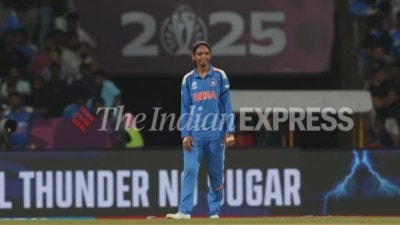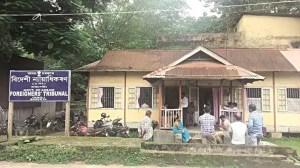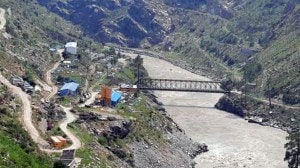Brajesh, Aziz did spadework to bury past
It8217;s such a long journey from Agra to Islamabad, especially when there8217;s a terrorist attack on Parliament and a 10-month-long eyeb...

It8217;s such a long journey from Agra to Islamabad, especially when there8217;s a terrorist attack on Parliament and a 10-month-long eyeball-to-eyeball on the border thrown in.
But when the MEA finally releases its secret documents on the Islamabad visit, circa 2004, the Team of Four of Prime Minister A B Vajpayee, External Affairs Minister Yashwant Sinha, Principal Secretary Brajesh Mishra and India8217;s high commissioner to Pakistan Shiv Shanker Menon8212;the team which pulled off a deal with China this June8212;will be seen to have scored again.
On Pakistan8217;s part, too, there were four men in the boat: President Musharraf, Prime Minister Jamali, secretary of the National Security Council Tariq Aziz and director-general of the South Asia desk in the Foreign Office Jalil Jilani. The last, in a delicious twist of irony, is the same man who was thrown out by New Delhi last February, for having purportedly 8216;8216;paid off8217;8217; a woman from the Hurriyat.
It can now be told that the back-channel established by Brajesh Mishra and Tariq Aziz, according to sources as long ago as May last year, was instrumental in not only cutting through the layers of hostility of the last couple of years, but also establishing the key principle of simultaneity on terrorism and Kashmir that is the touchstone of the Islamabad deal.
So when Vajpayee and Musharraf finally met here yesterday, and the President told the Prime Minister that the time had come to 8216;move on8217;8217;8212;just as the PM had often stated himself8212;it didn8217;t take long for the delegations on both sides to arrive at an agreed format.
Aziz and Mishra are said to have set the ball rolling in May, barely a month after the PM embarked upon his now-famous April 18 peace initiative in Srinagar, at a lengthy meeting in London. They are since believed to have kept in touch, and, of course, met again when Mishra 8216;8216;suddenly8217;8217; arrived in Islamabad on January 1. Time and again at a press conference this afternoon, Mishra denied he met the director-general of the ISI Ehsan-ul Haq, the man who controls the covert terrorist operations in Kashmir. Asked who he had met, Mishra refused to divulge any details. 8216;8216;I have had several meetings to tie up loose ends for this joint statement,8217;8217; Mishra said. 8216;8216;I cannot disclose who I met, its upto my Pakistani friends to do so.8217;8217;
Neither side today was also willing to come out and talk about the 8216;8216;level8217;8217; of the bilateral dialogue, perhaps in deference to domestic sensitivities within India and the fact that the Election Commission would soon unfold its timetable for April-end elections, thereby driving Vajpayee8217;s government into caretaker mode. But the likelihood of Mishra and Aziz8212;both of whom are close confidantes of their political masters8212;leading a separate, parallel political track along the lines of the China model, remains very high.
Perhaps it was the Christmas day terrorist attack on General Musharraf that finally broke the ice between India and Pakistan. Sources here confirmed that Vajpayee was amongst the first leaders worldwide to send a message of relief that the President had escaped and a warning to watch out in the future.
This morning, too, when the PM called the President to thank him for helping make SAARC history for India and Pakistan, he wished him luck with his safety. 8216;8216;I wished him very good health,8217;8217; the President told journalists here today, adding, 8216;8216;what else could we do. We were both very happy.8217;8217;
In fact the second attack on Musharraf is also believed to have convinced none other than deputy prime minister L K Advani that things were getting dangerously out of control. The man who is said to have been behind the Agra debacle, when an agreed draft could not be finalised because Advani pointed out that 8216;8216;terrorism was not given equal priority to Kashmir,8217;8217; was now fully on board.
Still, it was Musharraf who had the last word. Commanded by an Indian journalist to complete the sentence in a press conference that was rapidly deteriorating into a party, the President obliged.
8216;8216;Jo Agra mein taar toota tha, voh Islamabad8217;8217; the Indian journalist said. A flummoxed Musharraf looked around for help. As the large hall of the Aiwan-e-Sadr rang out with laughter, the President of Pakistan said, 8216;8216;voh Islamabad mein jur gaya hai.8217;8217;
- 01
- 02
- 03
- 04
- 05































